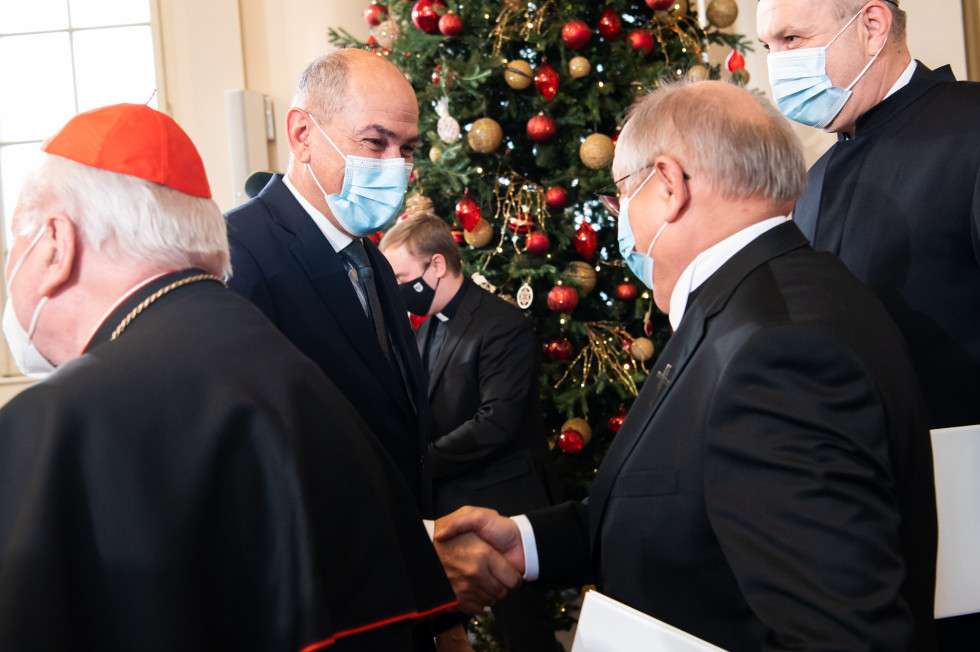The Prime Minister Janez Janša met with the Rector of the University of Ljubljana, Professor Dr Gregor Majdič, and the President of the Governing Board of the University of Ljubljana, Professor Dr Emil Erjavec.
The President of the Republic of Slovenia presented the Cardinal of the Roman Catholic Church, Franc Rode, with the Gold Order of Merit for his life’s work and his efforts towards Slovenian independence and establishing its role in the world, and for promoting a culture of interreligious dialogue. The President of the Republic of Slovenia awarded the Silver Order of Merit to Bishop Geza Filo for the successful, unifying and tolerance-oriented leadership of the Evangelical Church of the Augsburg Confession in Slovenia, and Mufti Nedžad Grabus for the successful, unifying and tolerance-oriented leadership of the Islamic Community in the Republic of Slovenia.
The former Slovenian archbishop and metropolitan Franc Rode was appointed cardinal in 2006 by Pope Benedict XVI. Franc Rode thus became the first cardinal from Slovenia. In the long history of the Catholic Church in Slovenia, he was only the third cardinal of Slovenian descent and the first in more than a hundred years. His appointment was therefore also a recognition of the young independent state of Slovenia.
Cardinal Franc Rode led the Archdiocese of Ljubljana and the Slovenian Metropolitan Province from 1997 to 2004, but was known to the general Slovenian public before, as a lecturer at the Faculty of Theology at the University of Ljubljana and editor of the Znamenje magazine in the 1970s. He always felt Slovenian, no matter how far his path led him from his homeland. As private secretary to French Cardinal Poupard in the Pontifical Council for Dialogue with Non-Believers in the Vatican, Franc Rode organised and participated in numerous meetings with representatives of institutions of non-believers, especially European Marxists. At a time of great change in Europe, he made an important contribution to establishing dialogue across the Iron Curtain and promoted interreligious dialogue at the end of the 1980s and later. As archbishop, Rode took Trubar’s words “stand and withstand” as the bishop’s motto. He paid a lot of attention to the regulation of relations between the Church and the state, and when he left this position, the Republic of Slovenia and the Holy See had concluded an agreement on legal issues.
Geza Filo has been a Lutheran priest in the Primož Trubar Evangelical Church in Ljubljana since 1985, and in 2013 he was elected bishop of the Slovenian Evangelical Church of the Augsburg Confession. He took over the episcopal duties from the first Protestant bishop Geza Erniša from Moravci and handed them over to Leon Novak from Murska Sobota last year. In his work he always tried to show that Protestantism is not only a Prekmurje tradition, but that with its significant impact on Slovenian culture and literature, it belongs to the whole of Slovenia and therefore the Reformation Day is a holiday for all Slovenians. He always paid a lot of attention to people in need. For a long time, he led the Protestant humanitarian organisation Podpornica, which helps people regardless of their religious or ideological affiliation. His work for the Foundation for the Financing of Disability and Humanitarian Organisations in the Republic of Slovenia was oriented towards the same goals. Aware of the need to know one’s history well, he participated in the founding of the secular Slovenian Protestant Society Primož Trubar, which studies Slovenian Protestantism on the academic level. With his work, Geza Filo has consolidated the Evangelical Church of the Augsburg Confession in Slovenia and brought it closer to people in central Slovenia, which is its historical origin. In doing so, he constantly reminds us of the ethical standards of Protestantism that will benefit us now and in the future.
Nedžad Grabus became a Slovenian public figure in 2006, when he was appointed Mufti of the Islamic Community in the Republic of Slovenia and came to Ljubljana. He completed his studies at the Gaza Husrev-beg Madrasa and the Faculty of Islamic Sciences in Sarajevo, where he then worked as an editor of religious programme on radio and television. He also experienced the war in Bosnia and Herzegovina.His goal was therefore clear: he was determined to connect the people of his community with each other in the new environment, and at the same time with the environment in which they live in Slovenia. Bridges need to be built between people, he said. “Each of us must have their little place under the sun, but they cannot create a world for themselves alone.”
In a decade and a half of work in Slovenia, he has managed to establish a strong relationship with the state and local authorities with a worldly, prudent, respectful and peaceful way of governing the Islamic Community. In 2007, on behalf of the Islamic Community, he signed an agreement with the Government of the Republic of Slovenia on the legal status of the Islamic Community in Slovenia. In public appearances, lectures and talks with Slovenian and foreign media, Mr Grabus is a voice of tolerance that draws attention to the shortcomings of social relations and calls for the establishment of peaceful coexistence and harmony in society for the common good.He has developed and consolidated intercultural and interreligious dialogue in Slovenia and Europe with patience and respect. Through all his work, he has developed and supported the values of a democratic society, which unites all individuals in the community in responsible citizenship.
Source: gov.si


